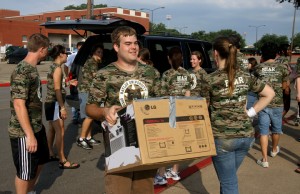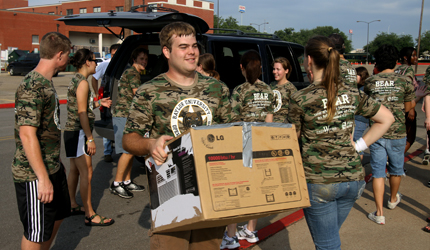
Nick Berryman | Staff Photographer
By Sally Ann Moyer
Reporter
Starting this fall, select Welcome Week leaders will continue to journey with and mentor incoming students throughout the semester in a structured format as part of the New Student Experience courses: University 1000, BU 1000, BIC 1212 and ECS First Year Seminar.
Applications for welcome week leaders and peer leaders are due today.
Keane Tarbell, associate director for new student programs, initiated the effort to implement the peer leaders program after attending a conference on peer leadership last fall.
“We have excellent student leaders who exhibit a passion for journeying with other students and the richness of that experience [at the conference] inspired me to come back and have some conversations with some folks here at Baylor. There was really a great receptivity to it; people just wanted us to think about how we would do it,” Tarbell said.
Jeff Doyle, dean for student learning and engagement, has worked with Tarbell, the provost office and others to develop the program.
“We are looking at new and innovative ways of helping our new students succeed with the desire of increasing retention, which basically means helping students stay in college and graduate from college,” Doyle said.
Adam Ecklund, director of engineering and computer science student initiatives, has collaborated with the planning team to incorporate elements of the already existing College of Engineering and Computer Science Delta Leader program.
The Delta Leader program is a mentoring program utilized within the ECS Living & Learning Center.
“Because ours was based on the idea of peer leadership, it was a natural fit to take it a step further this year. The peer mentoring piece provides even more structure,” Ecklund said.
Peer leaders will serve as Welcome Week leaders and then continue with the same small group for the rest of the semester.
All peer leaders will enroll in a three-credit-hour leadership course called “Special Topics in Leadership: Peer Leadership.”
“They’ll meet in the class one hour a week plus they’ll be co-teaching, co-facilitating the University-1000/BU-1000 section or the equivalent and then meeting with their students on the outside,” Tarbell said.
The goal is also to achieve a structured version of welcome week reunions and gatherings that have sporadically occurred among different groups in the past, Tarbell said.
“We have a requirement that peer leaders would meet with each student one-on-one twice to talk about topics such as involvement, purposeful involvement, perhaps strengths, perhaps academic goal setting, just kind of touching base and seeing how they’re doing,” Tarbell said.
The peer mentoring program will also help develop the returning students into more effective leaders.
“In this class, peer leaders will learn how to effectively mentor and guide new students to success,” Doyle said.
The program will also increase faculty interaction for all students involved.
“We’re just trying to create an incredible experience for our incoming students that they can transition to Baylor and be successful academically, spiritually, socially and physically,” Ecklund said.
Faculty members have been asked to nominate students to apply, but applications are open to any student.
“Concurrently, we also have a faculty recruitment going on for those sections,” Tarbell said.
Students interested in serving as peer leaders must first apply to be Welcome Week leaders and then indicate their interest on the application. Students can apply on baylor.edu/nsp.
After the group interview for Welcome Week leaders, individual interviews will occur for those interested in becoming peer leaders.
“In some ways, we’re calling this a pilot program. We’re not intending this first year for it to be everyone,” Tarbell said.
New student programs aims to choose about 40 to 60 out of a total of more than 300 student leaders to serve as peer leaders this year.
“If we are able to establish that [peer leaders] do make a difference, then we will work to make sure that all students have peer leaders,” Doyle said.






